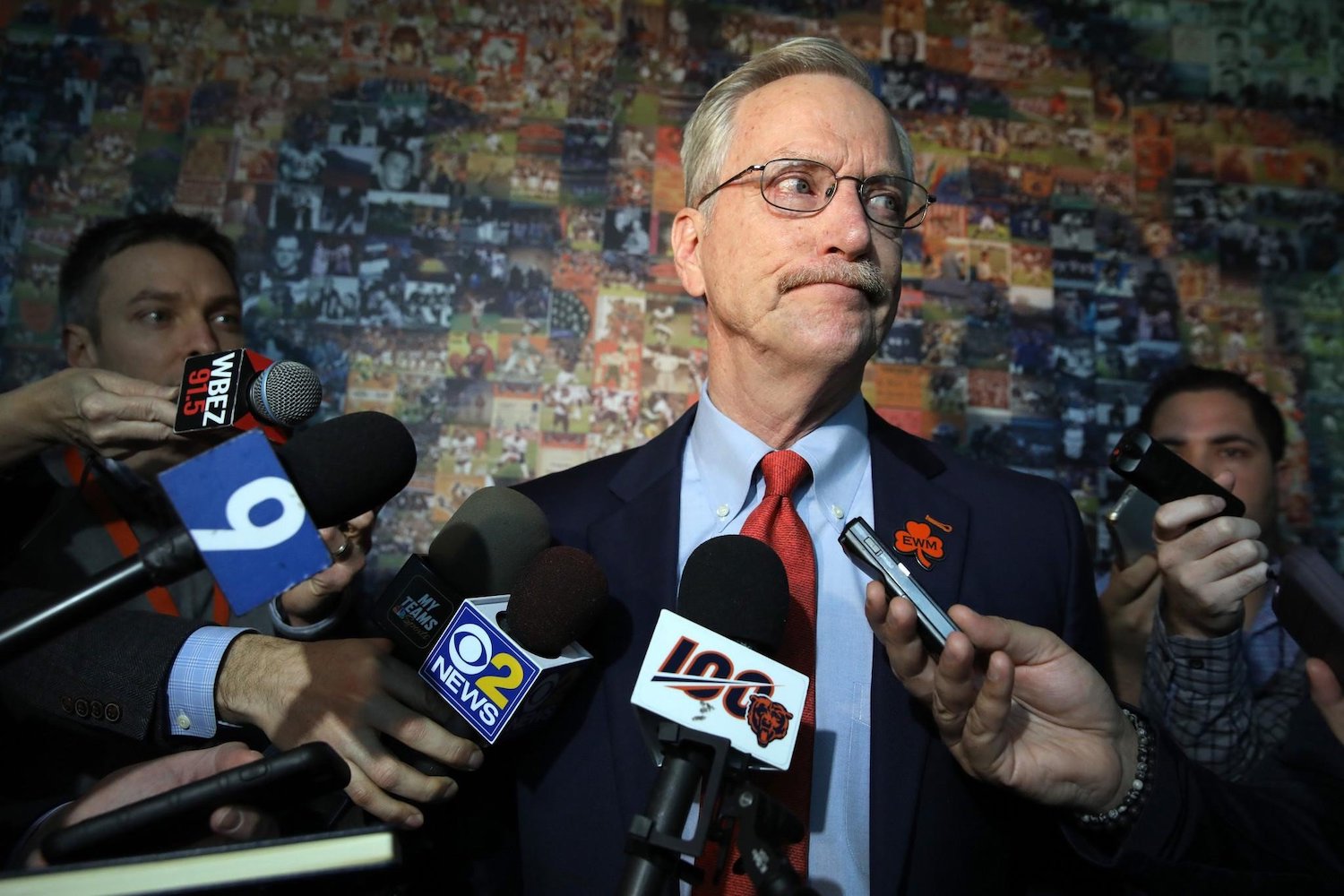The Chicago Bears did not play football last weekend. Neither did the Green Bay Packers — but for a completely different reason. The Bears didn’t play because they’re monsters of mediocrity who went 6-11 and missed the playoffs. The Packers didn’t play because they went 13-4, and won the National Football Conference’s lone first-round bye.
Bears vs. Packers is the most-played rivalry in National Football League history: 204 games since the Packers joined the league in 1921. When George Halas was alive, the Bears dominated, going 72-57-6 from the 1920s through the 1980s. Since then, the Packers have gone 46-19, and now lead the all-time series, 103-95-6. The Packers have won 21 of their last 25 games against the Bears. The football team from the third-largest metro area in the nation can’t beat the team from the smallest market in pro sports: Green Bay, population 104,777. It’s a town that should, maybe, have the most snowmobiling trophies, but instead it has the most NFL championship trophies. To put things in perspective, this is like the Cubs getting owned by the Lansing Lugnuts.
When two teams have such divergent fortunes for so long, we can’t blame the players (the average career lasts three years). We should instead blame the management. The Bears and the Packers have completely different ownership models: one is a family heirloom, passed down from father to daughter to son; the other is a publicly held nonprofit corporation.
There’s an old saying about family wealth: “shirtsleeves to shirtsleeves in three generations.” Driven go-getter Gramps earns the fortune, then his spoiled grandchildren fritter it away. Halas paid $100 to enter his Decatur Staleys into the American Professional Football Association in a meeting at a Canton, Ohio, car dealership in 1920. The team is now worth $4.1 billion. His grandson, Bears Chairman George McCaskey, isn’t going broke. But he is squandering his grandfather’s football legacy. George Halas was one of the most important figures in football history: as an end for the University of Illinois, he was the most valuable player of the 1919 Rose Bowl; after founding the Bears, he coached them for 40 seasons, longer than anyone in NFL history. McCaskey has a law degree from Arizona State, and calls himself “a fan, not a football evaluator.”
Last week, Tribune sportswriter Paul Sullivan wrote a column ridiculing the press conference McCaskey held to explain why he fired coach Matt Nagy and general manager Ryan Pace (as if that needed explaining): “Say what you will about the McCaskey family and its mismanagement of the Bears, but it has retained a staggering sense of self-confidence, at times bordering on arrogance, despite a glaring lack of success under its stewardship.”
McCaskey serves at the pleasure of the Bears’ board of directors, five of whose eight members are named McCaskey. As his mother Virginia once said, the team will stay in the family until “the Second Coming.”
Related Content
The Green Bay Packers, on the other hand, have 361,300 owners — the shareholders of Green Bay Packers Inc., the non-profit that runs the team. Soliciting funds from the community was the only way for a small-town team to compete; it was also consistent with the Wisconsin Idea, the progressive movement that led to the founding of public radio, graduated income taxes, primary elections, and workers’ compensation laws.
The shareholders elect a board of directors to make football decisions. Its seven-member executive committee — who all have different last names — is led by a real football guy: Mark Murphy, who won Super Bowl XVII as a Washington Redskin. Public ownership is working for the Packers: They won 102 games in the 2010s, second only to the New England Patriots. Writing in The New Yorker in 2011, right after the Packers won Super Bowl XLV, sportswriter Dave Zirin had this to say about how reporting to an elected board made the general manager’s job easier: “This structure allows [Ted] Thompson to execute decisions, even unpopular ones, without an impatient, jittery billionaire breathing down his neck. Since his hire in January 2005, Thompson has made his share of controversial moves. But unlike his G.M. brethren around the league, who carry little or no job security, Thompson has been given the space to see his moves succeed or fail on their own accord. It was Thompson who decided to jettison legendary quarterback Brett Favre in 2008 for the unproven but younger and considerably lower maintenance Aaron Rodgers.”
Aaron Rodgers has, by now, been proven. He’s 22-5 against the Bears, and is the favorite to win his fourth MVP award this year. The Bears haven’t had a good quarterback since Sid Luckman retired in 1950.
Unfortunately, the Bears couldn’t follow the Packers’ ownership model, even if the public could pry the team out of Virginia’s cold, still-living hands. The NFL — an institution Hunter S. Thompson once called “the last bastion of fascism in America” — amended its constitution in 1960 to specify that “charitable organizations and/or corporations not organized for profit and not now a member of the league may not hold membership in the National Football League.” The Packers benefit from a grandfather clause, while the Bears suffer under a grandson.
Public ownership wouldn’t work in Illinois, anyway. Look at who we’ve elected to run our city and state. We’d do just as badly electing people to run the Bears.



